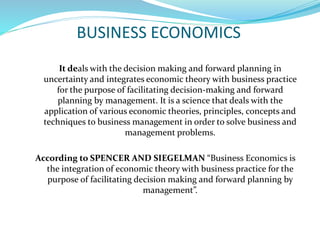Business and Economics Strategies for Enduring Growth in a Evolving World
Business and Economics Strategies for Enduring Growth in a Evolving World
Blog Article
Service and Business Economics 101: Essential Expertise for Striving Leaders
In today's quickly developing organization landscape, striving leaders need to cultivate a comprehensive understanding of fundamental calculated structures and economic principles. Mastering principles such as supply and demand, market frameworks, and competitors is not just academic; these elements are important in forming reliable decision-making and cultivating advancement.
Recognizing Supply and Demand
Supply and demand are basic concepts that consistently underpin the mechanics of any market economic climate. The relationship in between these two pressures determines the cost of items and services along with their availability in the marketplace. Supply describes the quantity of a product that producers are able and prepared to sell at numerous price levels, while demand reflects the quantity that customers want and able to acquire.
When need increases without a matching increase in supply, costs tend to increase, indicating producers to enhance output. Conversely, if supply outstrips need, costs might fall, prompting producers to minimize output. This dynamic interaction helps to attain market stability, where the quantity supplied matches the quantity demanded at a certain price point.

Exploring Market Frameworks
Market frameworks define the competitive setting in which companies run, dramatically affecting their rates strategies, result levels, and overall earnings. Comprehending these structures is critical for aspiring leaders, as they form business decisions and market characteristics.
There are 4 primary kinds of market frameworks: excellent competitors, monopolistic competitors, oligopoly, and monopoly. In a flawlessly open market, many companies use identical items, resulting in price-taking habits. Monopolistic competition attributes several firms marketing set apart items, enabling for some rates power. Oligopolies include a couple of dominant companies that can influence market value, usually causing critical communications and competitive behavior. Monopolies exist when a single company regulates the market, resulting in the highest possible degree of prices power and potential market inefficiencies.
Each market structure offers unique difficulties and opportunities for services. Leaders should recognize these subtleties to effectively place their companies, establish competitive strategies, and react to market adjustments. By realizing the implications of numerous market frameworks, aiming leaders can make informed choices that drive their companies towards sustainable success and growth in an ever-evolving financial landscape.
Financial Principles for Leaders
Effective management in business necessitates a strong understanding of economic principles, as they underpin calculated decision-making and source allotment. Leaders need to grasp crucial ideas such as capital monitoring, earnings evaluation, and economic projecting. These aspects are crucial in evaluating a company's economic wellness and directing its future instructions.
Capital management is especially important; it ensures that the organization keeps adequate liquidity to meet its obligations while going after development opportunities. Assessing productivity allows leaders to identify which solutions or products produce the highest returns, enabling enlightened financial investment choices. Furthermore, financial forecasting helps prepare for future earnings and costs, helping with more exact budgeting and source allowance.
In addition, comprehending monetary declarations-- such as balance sheets, revenue declarations, and capital declarations-- gears up leaders with the insights necessary to make enlightened selections. This expertise fosters liability and transparency, boosting stakeholder trust fund.
In today's dynamic organization atmosphere, leaders must be experienced at translating economic data to respond quickly to market adjustments. Ultimately, a solid understanding of financial concepts encourages leaders to drive their companies towards sustainable success while properly taking care of sources and risks.
The Function of Competitors
Understanding the function of you can try here competition is crucial for any kind of business intending to prosper in a saturated market. Competition drives development and performance, engaging businesses to enhance their solutions and items continuously.
Furthermore, competitors can result in far better prices strategies. As firms try market share, they are incentivized to provide competitive prices, profiting consumers while difficult companies to handle expenses effectively. This vibrant fosters a society of continual renovation, pushing organizations to improve operations and boost value click for more info proposals.
Additionally, competition can boost market growth by motivating brand-new participants. New companies often introduce fresh ideas and methods, even more improving the total market landscape. However, firms have to additionally be vigilant; too much competitors can result in market saturation, lowering earnings for all gamers included.
Ultimately, understanding and browsing competition is important for leaders. By identifying its multifaceted function, aiming leaders can make informed choices that place their companies for long-term success in an ever-evolving industry.
Strategic Decision-Making
In the world of service, strategic decision-making is essential to adapting and accomplishing lasting objectives to altering scenarios. This process includes evaluating different options and selecting one of the most efficient program of action that aligns with the organization's vision and objectives. Reliable critical decision-making requires an extensive understanding of both outside and inner atmospheres, including market trends, affordable characteristics, and business abilities.
Leaders need to gather appropriate information, examine it critically, and forecast possible outcomes. In addition, analyzing threats linked with each alternative makes it possible for leaders to expect challenges and develop backup strategies.
Eventually, effective tactical decision-making equips organizations to navigate intricacies, take advantage of chances, and respond proactively to risks. By growing a society that values notified decision-making, organizations place themselves to this content introduce and preserve an one-upmanship in an ever-evolving company landscape. Aspiring leaders should develop these skills, as their capacity to make sound strategic decisions will substantially influence their organizations' success and sustainability.

Conclusion
Recognizing the duty of competition more boosts critical reasoning, making it possible for leaders to browse complex market dynamics. Eventually, this foundational knowledge outfits future leaders to innovate and align business methods with progressing market problems, paving the way for sustained success and profitability.
Recognizing these principles is vital for striving business leaders, as they create the structure for reliable decision-making in pricing, resource allocation, and market strategy. Understanding supply and demand gears up leaders to navigate the intricacies of market changes and consumer habits.
Monopolies exist when a single firm controls the market, resulting in the highest possible level of rates power and possible market inadequacies.
By comprehending the implications of numerous market frameworks, aiming leaders can make enlightened decisions that drive their services toward sustainable success and growth in an ever-evolving economic landscape.
Understanding the duty of competition more enhances critical reasoning, allowing leaders to navigate complicated market dynamics.
Report this page